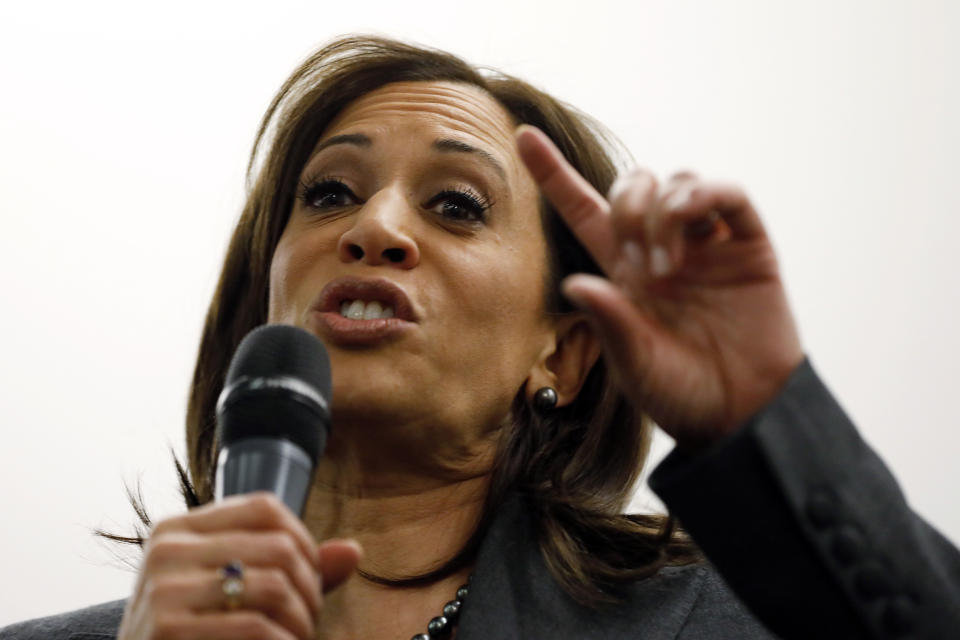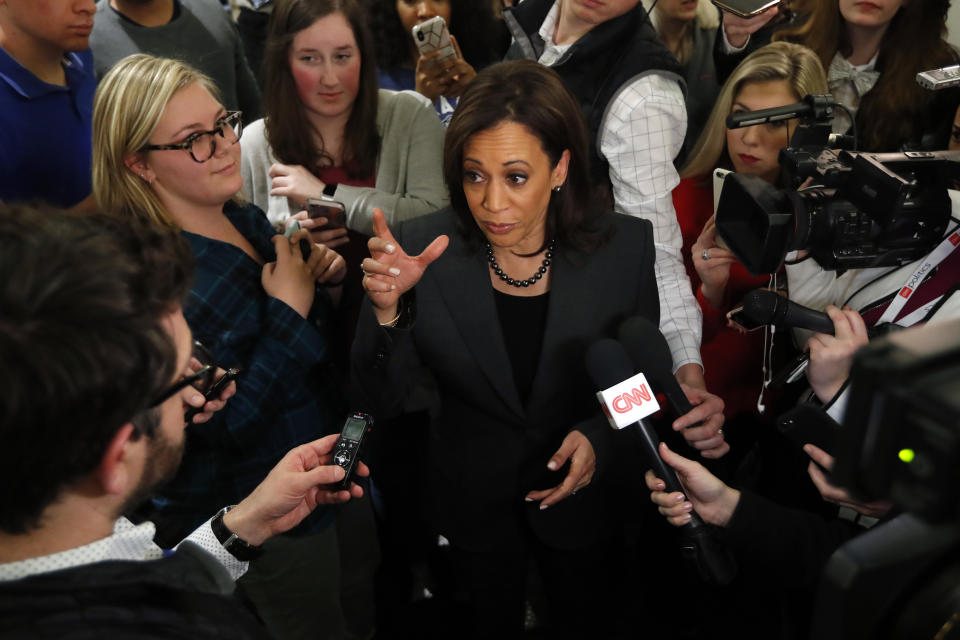Key takeaways from Kamala Harris' big 2020 campaign rollout
OAKLAND, Calif. (AP) — Democrat Kamala Harris arrived onto the 2020 stage this week with a presidential campaign rollout that was hard to miss. From her announcement in an interview on ABC's "Good Morning America," to the nationally televised town hall in Iowa, the California senator showed she was on message and all in.
The carefully orchestrated affair helped earn her nearly a week of national headlines and millions of dollars in campaign contributions. It also revealed much about the candidate and her strategy. Here's a look at what we learned about Harris in her first week as a declared presidential candidate.
AT THE STARTING LINE
Harris wasn't the first Democrat to join the race to take on President Donald Trump, but the capstone of her rollout — a lofty speech in her hometown of Oakland — separated her from the pack so far.
Other early entrants have held small-group events or speeches. Harris staged a campaign-style rally. The event drew thousands of people to downtown Oakland, where Harris spoke against a backdrop of American flags to a crowd that spilled into overflow areas. Large screens at the event displayed a campaign slogan that made an overt nod to her career as a prosecutor, and a logo that took inspiration from Shirley Chisholm, the first black woman to run for president in a major party. It took organization and planning, particularly for a campaign that is just officially getting off the ground but, with a number of experienced political aides, has also been months in the making.
Harris's advisers estimated the crowd at more than 20,000, and it spread from the plaza into the surrounding streets. Before Harris took the stage, a local pastor delivered an invocation with political overtures, a gospel choir belted the national anthem and Bay Area musicians performed.
Harris, who would be the first woman and the first black woman president, seized other moments to punctuate her history-making candidacy. She announced her candidacy on the Martin Luther King, Jr. holiday. She followed that speech up with a homecoming of sorts to her alma mater, Howard University, and a sprint to South Carolina to speak at a gathering of the Alpha Kappa Alpha sorority, of which she is a member.
DEFINING HER STORY
Harris's campaign knows many people don't know much about the first-term senator. She was ready to fill in the blanks.
Her California speech was full of biographical details and she cast herself the center of a quintessentially American story. Her parents were both immigrants, her mother from India and father from Jamaica, who she said "like so many others ... came in pursuit of a dream."
Harris said she and her sister Maya, who will serve as her campaign's chair, were raised "to believe that public service is a noble cause and the fight for justice is everyone's responsibility."
She invoked Bob Marley: "You've got to get up and stand up and don't give up the fight."
But Harris also showed she was ready to defend her vulnerabilities. The former prosecutor has been criticized by some criminal justice advocates as being too tough on the accused during her tenures as the San Francisco district attorney and California attorney general. She answered those criticisms by declaring, "Too many black and brown Americans are locked up" and suggesting she supports reforms.
"My whole life, I've only had one client: The people," Harris said during Sunday's speech, framing her law enforcement career as one focused on helping others.
EARLY STATE STRATEGY
From her California launch, Harris headed to Iowa to participate in a CNN town hall where she fielded questions from Iowa voters, followed by a stop at a local watch party. Monday's town hall did double duty. It put Harris face-to-face with the key early voters. But it also allowed Harris to continue to introduce herself to a national audience.
On Tuesday, CNN announced that the town hall was the most watched single-candidate election town hall on cable news ever.
Ahead of the town hall event, Harris's campaign announced that she'd named Deidre DeJear, whom she supported in her race to become Iowa's secretary of state, as her campaign chair in Iowa. Harris's campaign also added Will Dubbs, a Clinton campaign alum, as Iowa state director, both early additions and signs of how Harris's nascent campaign is growing in the leadoff state.
While Harris traveled to Iowa and South Carolina in the first week of her campaign, and has clearly made California a focal point, she is also making moves in New Hampshire, recently adding Craig Brown as her state director. Brown, a well-known New Hampshire politico, served as campaign manager for Democratic gubernatorial nominee Molly Kelly. Harris, though, has yet to appear in New Hampshire herself.
ON POLICY
During the town hall, which tilted heavily toward policy questions, Harris again defended her law enforcement background and seemed to throw her support behind a number of left-leaning ideas, including suggesting she would back a "Green New Deal." She did not provide specifics.
And already, one of Harris's responses is being questioned by some of her would-be rivals in the race.
Moderator Jake Tapper questioned her on whether the "Medicare for All" health plan, which she said she feels "very strongly" about, would mean eliminating private insurers for those who would prefer to keep them.
"The idea is everyone gets access to medical care," Harris responded, noting situations where patients have had to wait for insurers to approve treatments, despite the fact that their physicians have deemed them necessary.
Former Starbucks CEO Howard Schultz said Tuesday that Harris wants to "abolish the insurance industry," something he called "not American." And in New Hampshire, Michael Bloomberg, the former mayor of New York City, said of Harris's position: "I think you could never afford that," and argued that replacing the "entire private system" would not be practical.
SETTING THE TONE
In the first full week of her campaign, Harris demonstrated how she would seek to differentiate herself from Trump. At the Iowa town hall, she was asked by a voter how she would debate Trump "without becoming reactive" or "getting caught up in his crazy."
Harris said that she would "speak like a leader" rather than "inciting fear."
Harris's rebuke in Iowa of Trump was a theme she echoed on Sunday in her Oakland speech, where she told attendees that "I will always speak with decency and moral clarity and treat all people with dignity and respect."


